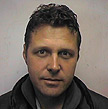 |
P.O.V.'s Borders visitors sent Dennis
Michelini these questions in response to his work and his
answers to P.O.V.'s initial 6 Questions. Read on!
The views expressed are those of Agent Dennis Michelini, and they
do not represent the views of the U.S. Border Patrol nor the Immigration
and Naturalization Service.
Question: Do you ever wish that you didn't have a job that brought
you face to face with certain painful human realities — death,
poverty, sacrifice, corruption, etc.? Every job has its moral complexities,
but there are certainly jobs out there where you aren't forced to
face them every day.
Dennis: It is not as horrifying as you make it sound. Moral complexities
are always more complex when seen from a distance, when chatted
about over coffee, or when soliloquized by a college professor.
But when you're up to your elbows in these complexities it is evident,
it becomes evident to you, that very quickly a decision must be
made. A narcotics arrest transpires in seconds and yet a defense
lawyer will have months to review the event. Graphed out on a timeline,
it would resemble a teeter-totter way off center. Unfortunately
it makes the act look hastily done and poorly thought out.
I suppose it is always better to do more in life than to do less.
I also suppose it is better to ponder what you have done than to
not. When you sit down at the end of the day to debate "certain
painful human realities" at least, if you are following the
"do more" theory of life, you are bringing something to
the table. This isn't hubris or occupational boasting. When conversations
are only hypothetical, they retain massive gray areas. Fantastically
articulate points and counterpoints ricochet against one another.
Indecision swells until the matter under discussion resembles a
dense fog, and a judgment either way appears radical. You become
intellectually frozen, and when asked murmur something scholastic,
"It's a complicated issue. I don't really have an opinion on
it." Something that if I were a little brighter I'd be saying
to a few of these questions listed below. But when you have to do
this thing, this point under debate, you do it. At times you move
mechanically. Other times you are mindful and cognizant.
Question: When tracking immigrants crossing the border, did you
ever considering helping them cross, as opposed to arresting them?
Dennis: No. In the smaller towns along the border you occasionally
hear this question. From their perspective, what would a few more
really matter — why wouldn't you just turn your back? The illegal
crossers from Mexico have a tremendous advantage over those wishing
to come the States from other corners of the globe. They have a
relatively receptive community just on the northern side of the
border. When somebody from Carrizo Springs, Eagle Pass or Laredo
asks that question they don't imply that I let all the world's illegal
crossers pass, just those from across the river. This country has
an immigration policy, and there are legal ways to enter.
Question: What's your opinion of the "Wet Foot/Dry Foot"
policy here in Florida? In light of the recent events regarding
the over-200 Haitians to land in Miami, do you think they should
be treated as the Cubans? Or as expressed in local newspaper editorials,
the Cubans should be treated as the Haitians? Finally, do you feel
this is reflecting the homeland security of protecting our borders
since we have so many rafters and boat people coming ashore? Do
you think our southern borders should be more heavily guarded to
prevent these illegal entries?
Dennis: I hesitate to answer this question because I am not familiar
with the specifics of the wet foot/dry foot policy in Florida. If
there is unfairness, off hand I would attribute it to our political
history with Cuba and the Cuban voting block within Miami.
Question: Dennis — from your last name — I'm guessing
Italian. I'm curious about what border your family crossed in order
to enter this country? And also out of curiosity, have you ever
looked up the name of the border patrol agent who let them through?
Dennis: I believe both sides of my family came across about a hundred
years ago in the New York area. I found one side of my family in
the internet records from Ellis Island. The Border Patrol was not
established at that time. My great grandparents would have entered
through an Immigration Agent working at the port of Entry.
Question: I would welcome anyone who is looking for a better
life. Unfortunately, the majority of immigrants in my neighborhood
come here with one thing in mind: money to send back home. The money
being made in this country is being sent out of it to support families
in other countries. If we don't spend some of that income here,
all Americans will soon be out of work. I also object to the majority
being paid under minimum wage and without paying taxes. Please write
back. I would love to hear other opinions.
Dennis: Fortunately for us, it is not against the law to send money
to relatives who live in other countries, and we are equally fortunate
not to live under a government so intrusive as to ban us from doing
so. I've worked for less than minimum wage, and while laboring at
that job I never imagined I'd be upsetting anybody. Enjoy your freedoms.
If someone is living in a foreign culture, working for less than
minimum wage, and sending what little they make back home, off hand
I'd say they are a good, decent sort of folk, and nothing to be
too upset about.
|
 |
 |


![]()





